Sat 6 Jan 2024
MILTON “MEZZ” MEZZROW & BERNARD WOLFE – Really the Blues. Random House, hardcover, 1946. Reprinted several times since, including Dell D118, paperback, 1953, and Signet, paperback, 1964.
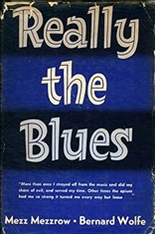
“To all the hipsters, hustlers, and fly cats tipping along The Stroll. (Keep scuffling.) To all the cons in all the houses of many slammers, wrastling with chinches. (Short time, boys.) To all the junkies and lushheads in twobit scratchpads, and the flophouse grads in morgue iceboxes. (R.I.P.) To all the sweettalkers, the gumbeaters, the highjivers, out of the gallion for good and never going to take low again. (You got it made, daddy.)â€
Mezz Mezzrow was a Jewish dude who longed to be a black jazzman. He lived a life that had him in the orbit of Louis Armstrong (he was Armstrong’s marijuana dealer), playing jazz with Sidney Bichet, Bix Beiderbecke and Gene Krupa, he played the clubs of Al Capone and Legs Diamond, he got hooked on heroin, jailed at Riker’s, lived in Harlem married across the miscegenation lines and lived to tell the tale.
He was convinced to partner up with a writer to get the story down, “talking to me about writers I never heard of, Andre Gide, B. Traven, Céline, Henry Miller and guys like that, and reading parts of their books to me. He says, ‘Mezz, you’ve got a story to tell just like those writers did, and it deserves to get down on paper. watching the screwy kaleidoscope of American life jiggle and squirm over your head. Not very many people have gotten a good look at their country from that bottom-of-the-pit angle before, seen the slimy underside of the rock. It’s a chunk of Americana, as they say, and it should get written. It’s a real American success story, upside down: Horatio Alger standing on his head. It’s the odyssey of an individualist, through a land where the population is manufactured by the system of interchangeable parts. It’s the saga of a guy who wanted to make friends, in a jungle where everybody was too busy making money and dodging his own shadow. If I’d known I was being significant, instead of just hungry and beat, I sure would have changed my ways. This is the book. If it got in your mouth, don’t fault me. Like I said, it’s a story that happened in the U.S. of A.’
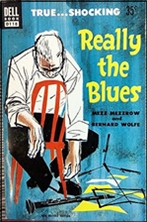
At Riker’s, Mezz insisted on being classified as Black because “colored cons were different; almost any colored guy can land in jail, not just the soulless zombies who have already shriveled up and died inside and are just postponing their date with the undertaker’s icebox. Some of the finest, most high-spirited guys of the race landed in jail because of their conditions of life, not because they were rotted and maggot-eaten inside –far away from all this grimy, grating white underworld, up in Harlem where people were real and earthy.”
Jazz, to Mezz, was the soundtrack of Roaring Twenties America: “jazz was only a musical version of the hard-cutting broadsides that two foxy studs named Mencken and Nathan were beginning to shoot at Joe Public in the pages of The American Mercury — a collectively improvised nose-thumbing at all pillars of all communities, one big syncopated Bronx cheer for the righteous squares everywhere. jazz, making itself heard above the rattle of machine guns and the clink of whisky bottles. The sprawling outside world, they found, was raw and bubbling, crude, brutal, unscrubbed behind the ears but jim-jam-jumping with vital spirits; its collar might be grimy and tattered, but it was popping with life and lusty energy, ready for anything and everything, with a gusto you couldn’t down. And jazz, its theme song. These kids went for that unwashed, untidy world, and they made up their minds to learn its unwashed, untidy music –all the decent, respectable citizens who were home in bed having decent, respectable nightmares instead of braying through their horns at the stars –jazz music was, in a way, practically the theme-song of the underworld because, thanks to prohibition, about the only places we could play like we wanted were illegal dives…..turbanned Hindus, ramrod-spined Englishmen balancing monocles, swarthy cattlemen from the Argentine, sugar planters from Batavia, sabre-scarred Prussian officers, bullfighters from Madrid, college kids with crew haircuts from Wilkes-Barre and Des Moines”.
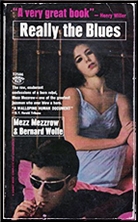
The book has a host of great hardboiled one-liners:
● He had more music in him than Heinz has pickles.
● It takes a long, tall, brown-skin gal to make a preacher lay his Bible down.
● Don’t look for no chitlins before you kill your hawg.
● I was locked up in a cage that would have cramped a canary.
● The poor guy squirmed and wriggled like a jellyfish with the d.t.’s.
● It’™s a hell of a life, said the Queen of Spain, Three minutes’ pleasure and nine months’ pain
● … as winded as Paul Revere’s horse.
● there wasn’t enough room in it for a midget to swing an underfed kitten,
· corny? Sure, the husks are still on it
● Rotgut and remorse trickled through Uncle Sammy’s veins.
● … his face as long as a sigh
· blow my nose and call me Snorty
● … frail as a nail and twice as pale
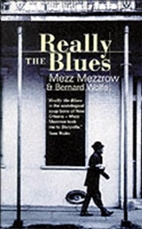
● That town was sad as a map and twice as flat
● … no bigger than a blink
· the chorus lumbered around like a herd of asthmatic cows.
● … emotional pickpockets
● The days oozed by like a melted movie film, all run together.
● (ode to the dead): Plant you now, dig you later
● If you pried the lid off my skull with a can-opener, you might have spotted some weird eels snaking through the whirlpool I lugged around under my hat.
In the end, after a life drug thru the wringer, jailed, drug addled, left out soggy in the rain, Mezz’s reward was to finally understand jazz and be able to finally play it:
“F]or the very first time in my life, you see, I had fallen all the way into the groove and I was playing real authentic jazz, and it was right, not Chicago, not Dixieland. …Now I was no more afraid. All the rambling years behind suddenly began to make sense, fitted into the picture: the prison days, the miss-meal blues, the hophead oblivion, the jangled nerves, the reefer flights, the underworld meemies. They were all part of my education, had gone into my make-up until I was battered and bruised enough to stumble into the New Orleans idiom and have something to say in it ..We here, and we going to stay put … don’t recognize no eviction notices from the good green earth. Life gets neurotic and bestial when people can’t be at peace with each other, say amen to each other, chime in with each other’s feeling and personality; and if discord is going to rule the world, with each guy at the next guy’s throat, all harmony gone. Why, the only thing for a man to do, if he wants to survive, if he won’t get evil like all the other beasts in the jungle, is to make that harmony inside himself, be at peace with himself, unify his own insides while the snarling world gets pulverized. He carried his own environment around inside him.”
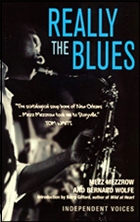
His only dream remains: “I don’t aim to have my fillings and bridgework picked out, to fatten the Bull Durham sack in some junkie’s or lushhead’s pocket. Uh, uh. Just take my body and shove it in one of them blast furnaces, and when I’m melted down good, scrape out the dust and mix it up with some shellac and press it into a record with a King Jazz label on and then take it up to Harlem and give it to some raggedy kid on The Corner who hasn’t got the price of admission to see the stage show at the Apollo or a deuce of blips to buy himself a glass of foam. until he gets tired of it, and then let him throw it away and that’s that. Just do that, and you’ll know I’ll be happy. That’s memorial enough for me.”
—
I dug it. It lags in the middle when Mezz gets addicted to heroin and lands in the clink. But it’s real and the lag was a lag Mezz experienced and was important to his coming out on the other side. If, as Welles says, movies are life with the boring bits cut out,”this one leaves in the boring bits. But without the boring bits (for Kierkegaard tells us that “boredom is the root of all evil”) how are we to understand the motivation towards redemption. Towards some jazzy heaven Mezz Mezzrow bebops towards with every breath and footstep.
January 6th, 2024 at 8:14 pm
Tony, This sounds exhilarating and exhausting, not unlike a drug high and crash, from the review, did it read that way?
January 6th, 2024 at 9:54 pm
David,
The analogy is apt. I got thru the ‘high’ part really fast—then the lull took me forever to read thru. I read the thing via an e-library loan and must’ve renewed the thing 8 times. When he’s happy it’s like what it must’ve been like to hang with Bix and jelly Roll and all those cats. Then when he gets down it’s a bit excruciating. Definitely an up and down trip.
January 7th, 2024 at 6:32 am
And another Baer review sends my mouse clicking furiously over to Abebooks. I read Wolfe’s “MEMOIRS OF A NOT ALTOGETHER SHY PORNOGRAPHER back in the early 70s and remember it fondly.
January 7th, 2024 at 11:54 am
Not to diminish Mezzrow’s story in any way, but reading those long quotes Tony provided, as well as the one-liners, all very striking, I wonder how much Wolfe’s input was in putting the book together. Substantial, perhaps?
[Added later] FWIW here’s the link to his Wikipedia page:
https://en.wikipedia.org/wiki/Bernard_Wolfe
Quite the celebrated writer in his day.
January 7th, 2024 at 12:12 pm
This was one of my father’s (born 1925, art teacher for 34 years) favorite books. He kept a battered copy of that Dell paperback at the head of his bed, with a dozen of his other favorites, for as long as I knew him.
I’ve never read it. Shame on me.
January 13th, 2024 at 9:08 am
While this one is one I’ve been meaning to read for quite some time, not least because Wolfe was the ghost (who clearly didn’t get Too far ahead of what Mezzrow wanted to say, for good or ill depending on beholder’s eye, as we see in comments here). Wolfe was a hell of writer when doing his own work. Mezzrow had a hell of a career. Again, even with the dull spots for you, Tony, another book you can probably trust for veracity ahead of Miles Davis’s autobio.